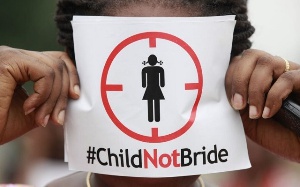Participants at a national stakeholders’ engagement have identified poverty, gender inequality, entrenched negative traditional and customary beliefs and co-habitation as major setbacks inhibiting the fight against child marriage in Ghana.
They said many parents give out their children for marriage because of economic opportunities while some children also move voluntarily from the home of their parents to settle with their ‘boyfriends’.
According to the Multiple Indicator Cluster Survey conducted in 2017, one in three children is involved in child marriage, representing 16 per cent of the incidence of child marriage in the country declining from 27 per cent in 2011.
The breakdown of the percentages of women between 20 and 24 years, who were first married before attaining 18 year are as follows: Western 23 per cent from 36.7 per cent, Central 22 per cent from 31.1 per cent and Greater Accra Region eight per cent from 12.2 per cent.
The rest are: the Volta Region 24 per cent from 29.1 per cent, Eastern 23 per cent from 27.1 per cent, Ashanti 17.7 per cent declining from 31.1, Brong Ahafo 17 from 29.1, Northern Region 28 per cent per cent from 27.6, Upper East 28 from 39.2 per cent and Upper West 20 per cent from the previous figure of 36.6 per cent.
This came to light at a stakeholders meeting on ending child marriage in Ghana, organised by the Ministry of Gender, Children and Social Protection and the Domestic Violence Secretariat, in Accra.
The meeting brought together Directors of the Department of Gender across the country, representatives of civil society groups, Domestic Violence and Victims Support Unit, Ghana Education Service, Ghana Health Service and the development partners, to review the Operational Plan on ending child marriage.
Madam Comfort Asare, the Director at the Department of Gender, said child marriage is a challenge globally, with 16 million children married off each year, adding that, of the figure, one in three children get married before age 15.
She said child marriage is a canker in Africa, resulting in adolescent pregnancies, extreme poverty, school dropouts and disease infections on victims and sexual and gender-based violence and this calls for stringent measures to address it.
“The reasons girls are married off at an early age are diverse, and parents sometimes believed that through marriage, they are protecting their daughters and increasing economic opportunities.
“However, this is an imagination that rather exposes girls and families to health problems, violence, denying them access to basic amenities and social network systems,” Madam Asare said.
Madam Asare expressed appreciation to the various players for partnering the Ministry to implement the first Operation Plan of 2017/2018 and urged them to come out ideas and strategies, to help the Ministry implement its next plan of action to eliminate child marriage in the country.
Ms Saphia Tamimu, an Assistant Programme Officer at the Gender Ministry, presented the overview of the National Implementation Plan on ending child marriage for 2019.
Mr Bawa Amadu read a statement from the Country’s Representative of the United Nations Population Fund (UNFPA), Mr Niyi Ojuolape, who described the stakeholders’ meeting as timely since it would afford the opportunity to share information, ideas and experiences to enhance partnerships and networking to combat child marriage.
He said it was imperative to improve on prevention efforts and effective management of cases to mitigate long term effects on the victims.
He expressed the UNFPA’s readiness to collaborate with the government, CSOs and other allied institutions to work out a plan to eliminate harmful practices in the country.
General News of Sunday, 15 December 2019
Source: ghananewsagency.org

















